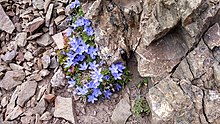Campanula piperi
| Campanula piperi | |
|---|---|

| |
| Scientific classification | |
| Kingdom: | Plantae |
| Clade: | Tracheophytes |
| Clade: | Angiosperms |
| Clade: | Eudicots |
| Clade: | Asterids |
| Order: | Asterales |
| Family: | Campanulaceae |
| Genus: | Campanula |
| Species: | C. piperi
|
| Binomial name | |
| Campanula piperi Howell
| |
Campanula piperi (Olympic bellflower,[1][2][3] Olympic harebell,[4] Piper's bellflower[5]) is a species of flowering plant in the bellflower family, Campanulaceae. It is native to the Olympic Mountains on the Olympic Peninsula in the U.S. state of Washington.[4] It has also been noted on Vancouver Island, British Columbia.[3]
Description
This species is a perennial herb with stems up to 10 centimeters tall. It is hairless or with fine, rough hairs. The basal leaves have toothed, widely lance-shaped blades up to 3 centimeters long. Leaves higher on the stem are similar and are alternately arranged. Flowers occur in July and August at the stem tips. Each has five toothed sepals and a saucer-shaped blue corolla with 5 lobes about 1.2 to 1.6 centimeters long.[3] White flowers are known to occur at times.[5]
Habitat
This plant grows in rocky, high-elevation habitat.[3][4] It faces the potential threat of trampling by mountain goats, an introduced species in the range.[4]
Cultivation
This species is cultivated in alpine plant gardens.[4] A number of cultivars have been bred.[5]
History
The species name commemorates the botanist Charles Piper.[5]
References
- ^ "Campanula piperi". Germplasm Resources Information Network. Agricultural Research Service, United States Department of Agriculture. Retrieved 23 January 2018.
- ^ Campanula piperi. USDA PLANTS.
- ^ a b c d Campanula piperi. Burke Museum. University of Washington.
- ^ a b c d e Campanula piperi. NatureServe. 2012.
- ^ a b c d Campanula piperi. Botany Photo of the Day. UBC Botanical Garden.

